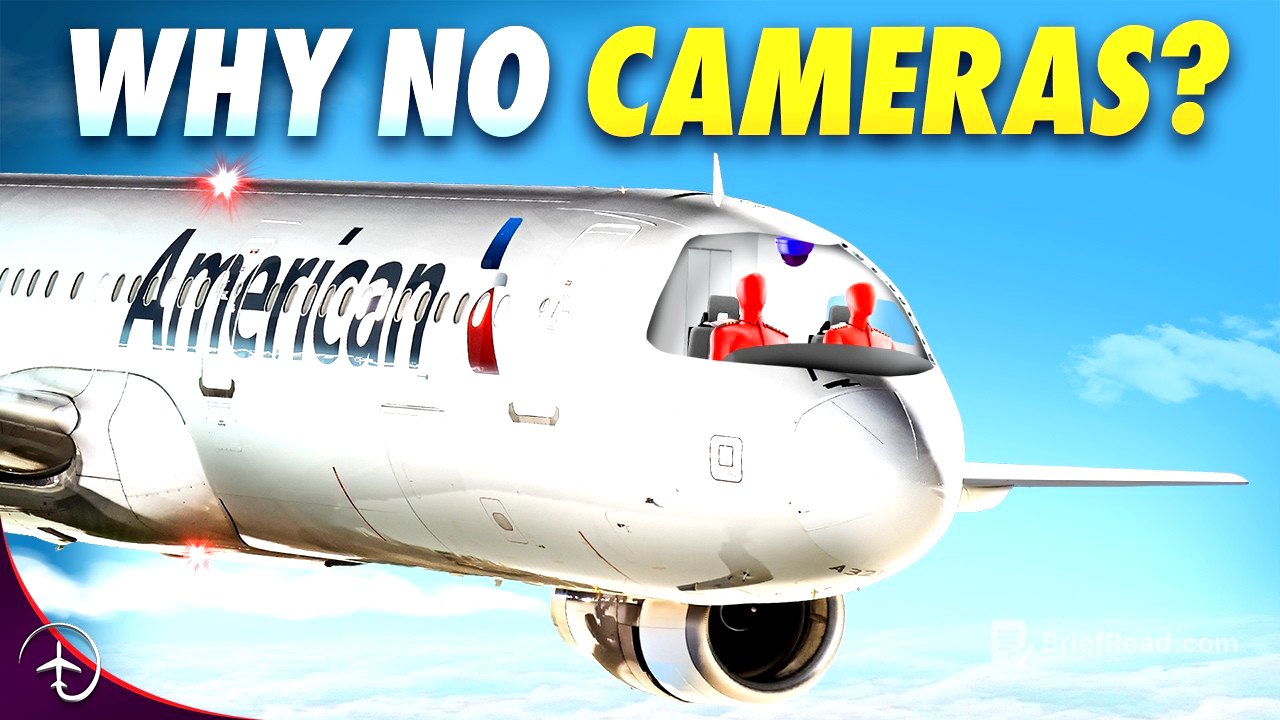TLDR;
This video explores the debate around installing cockpit cameras in airplanes, examining the reasons why they aren't standard despite the availability of technology. It addresses the potential benefits for accident investigations, the concerns raised by pilots and unions regarding privacy and trust, and possible compromises that could satisfy both investigators and flight crews.
- Cockpit cameras could significantly aid accident investigations by providing visual context to flight data and audio recordings.
- Pilots and unions raise concerns about privacy, potential misuse of footage, and the impact on cockpit culture and trust.
- Possible compromises include limited-scope cameras focused on instruments or triggered recording systems activated by specific events.
Intro [0:00]
The video introduces the concept of cockpit video recorders (CVR) as a potential third component of the "black box" system, alongside flight data recorders (FDR) and cockpit voice recorders (CVR). It highlights that while technology exists to implement CVRs, they are not yet standard in commercial aviation. The discussion will cover the benefits investigators believe CVRs offer and the reasons some pilots and unions are resistant to their implementation.
Why Don't Airplanes Have Cockpit Cameras? [2:00]
The absence of cockpit cameras as standard equipment is not solely due to technical or logistical challenges. While installing cameras on new aircraft is relatively straightforward, retrofitting older aircraft involves costs, re-certification, and downtime, making it expensive for airlines. The core issue is more complex, involving human factors, trust, and privacy concerns.
How Cockpit Cameras Could Help Crash Investigations [6:00]
Air accident investigators advocate for cockpit video recorders to enhance their ability to reconstruct events leading to accidents. The flight data and cockpit voice recorders often provide an incomplete picture. The video recordings could clarify ambiguities and provide context, potentially speeding up investigations and improving accuracy. Several accident examples, such as Atlas Air Flight 3591, Siri Airflight 182, and Egypt Airflight 990, are cited where cockpit video could have provided valuable additional information.
Why Are Pilots Against Cockpit Cameras? [14:00]
Pilot unions strongly oppose cockpit cameras, primarily due to privacy concerns. The flight deck is a high-pressure environment where pilots make critical decisions and express emotions, and there are worries about how this footage might be used or leaked. There are concerns that video recordings could be misinterpreted, misused by the media, or exploited on social media, potentially undermining the "just culture" that encourages open reporting of mistakes. The presence of cameras could also alter pilot behavior, making them more self-conscious and less likely to speak up or challenge decisions, which could negatively impact flight safety.
Would Cockpit Cameras be Safe from Leaks? [19:00]
Compromises are being explored to address pilot concerns while still providing valuable data for investigations. Limited-scope cameras focused on instrument panels or triggered video systems that activate only under specific conditions could be potential solutions. The key is to implement safeguards that protect privacy while preserving essential information for accident investigations. Guarantees on access to recordings, ensuring they are only used for accident investigations, are crucial for gaining pilot support. The video concludes by expressing hope that a mutually acceptable version of cockpit video recording will be introduced in the coming years, along with video feeds of other critical areas of the aircraft.








![[사나의 냉터뷰] 사나 언니 홀리러 온 아기 고양이 닝닝🐈⬛l EP.11 에스파 닝닝 편](https://wm-img.halpindev.com/p-briefread_c-10_b-10/urlb/aHR0cDovL2ltZy55b3V0dWJlLmNvbS92aS9NWjZyUjVYUm1XZy9ocWRlZmF1bHQuanBn.jpg)
